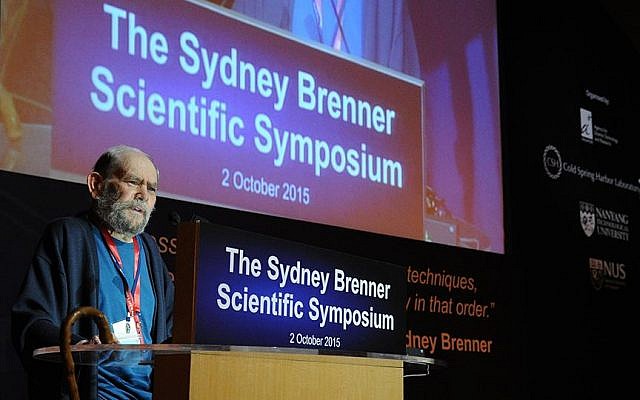Revolutionary scientist and Nobel Prize winner Sydney Brenner dies aged 92
Tributes paid to South African-born biologist who was recognised for his "series of brilliant sudden insights" while working at Cambridge in 2002
A revolutionary Jewish biologist who won a Nobel Prize in 2002 for his work at Cambridge has died, leaving the scientific world mourning the loss of one of the 20th century’s great minds.
Born in South Africa in 1927 to a Lithuanian father and a Latvian mother, Sydney Brenner’s beginnings were modest. His father, a cobbler, will illiterate, but at the age of three or four, Brenner taught himself to read from newspapers, which were used instead of tablecloths, “by looking at letters and finding out sounds”.
He later joked that he only ended up at medical school aged 15 “to escape” and got his degree aged 18, writing his first paper that year. A scholarship to Oxford soon followed, and he went on to make some of the most significant discoveries in the history of biology, transforming our understanding of how life works at the molecular level.
In 1953, Brenner met Francis Crick and Jim Watson just hours after they first discovered DNA’s double helix structure. The key question this posed to this small group was: how did the DNA in the gene enable the cell to produce the protein? In other words, how did the sequence in a gene determine the sequence in a protein chain?
Brenner set to work on the question that day. He knew proteins – hormones, enzymes etc – build and maintain our bodies, and discovered that the letters in a DNA sequence determine which amino acids the ribosomes should use to assemble the proteins.
He also established the role played by the molecule RNA in carrying the “code of life” held in the DNA sequence to the ribosome protein factories in cells.
Crick and Brenner worked together at Cambridge for 20 years, their work marked by “a series of brilliant, sudden insights,” according to peers. He worked with 1mm long nematode worms to investigate animal and neural development, identifying genes for important functions and even discovering a whole new set of proteins in the process.
Awards and honours followed, and he lived most of his life in Ely, Cambridgeshire, but travelled extensively, applying his rigour and imagination to help found scientific institutes in California, Japan and latterly Singapore, where he passed away on Friday, aged 92.

Thank you for helping to make Jewish News the leading source of news and opinion for the UK Jewish community. Today we're asking for your invaluable help to continue putting our community first in everything we do.
For as little as £5 a month you can help sustain the vital work we do in celebrating and standing up for Jewish life in Britain.
Jewish News holds our community together and keeps us connected. Like a synagogue, it’s where people turn to feel part of something bigger. It also proudly shows the rest of Britain the vibrancy and rich culture of modern Jewish life.
You can make a quick and easy one-off or monthly contribution of £5, £10, £20 or any other sum you’re comfortable with.
100% of your donation will help us continue celebrating our community, in all its dynamic diversity...
Engaging
Being a community platform means so much more than producing a newspaper and website. One of our proudest roles is media partnering with our invaluable charities to amplify the outstanding work they do to help us all.
Celebrating
There’s no shortage of oys in the world but Jewish News takes every opportunity to celebrate the joys too, through projects like Night of Heroes, 40 Under 40 and other compelling countdowns that make the community kvell with pride.
Pioneering
In the first collaboration between media outlets from different faiths, Jewish News worked with British Muslim TV and Church Times to produce a list of young activists leading the way on interfaith understanding.
Campaigning
Royal Mail issued a stamp honouring Holocaust hero Sir Nicholas Winton after a Jewish News campaign attracted more than 100,000 backers. Jewish Newsalso produces special editions of the paper highlighting pressing issues including mental health and Holocaust remembrance.
Easy access
In an age when news is readily accessible, Jewish News provides high-quality content free online and offline, removing any financial barriers to connecting people.
Voice of our community to wider society
The Jewish News team regularly appears on TV, radio and on the pages of the national press to comment on stories about the Jewish community. Easy access to the paper on the streets of London also means Jewish News provides an invaluable window into the community for the country at large.
We hope you agree all this is worth preserving.






















